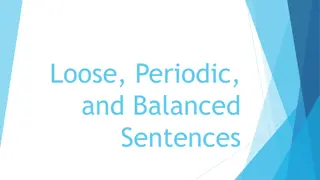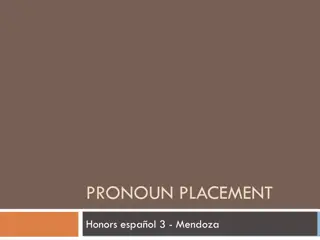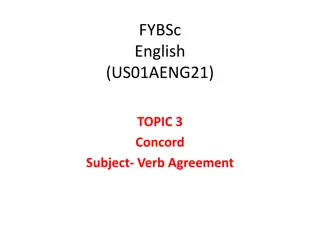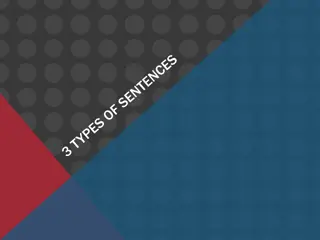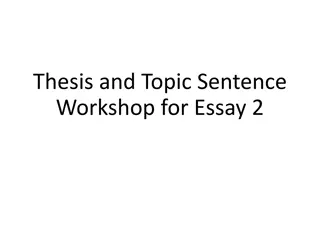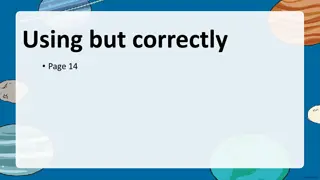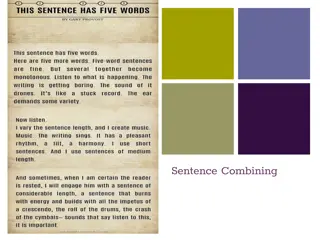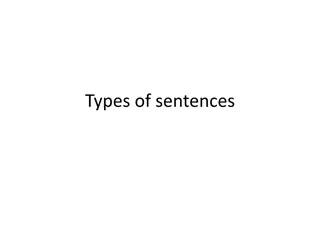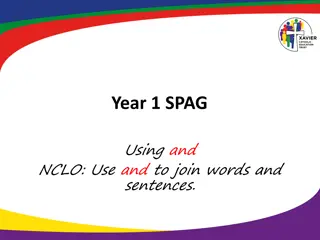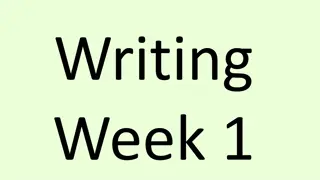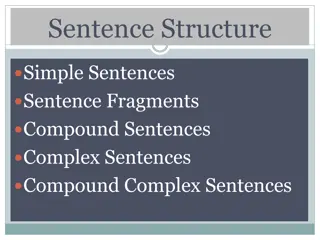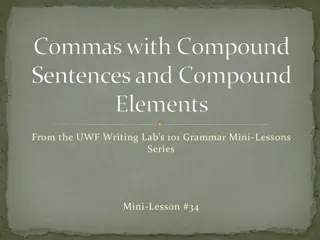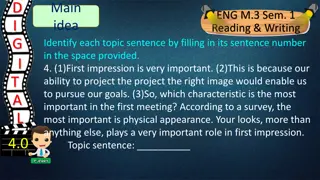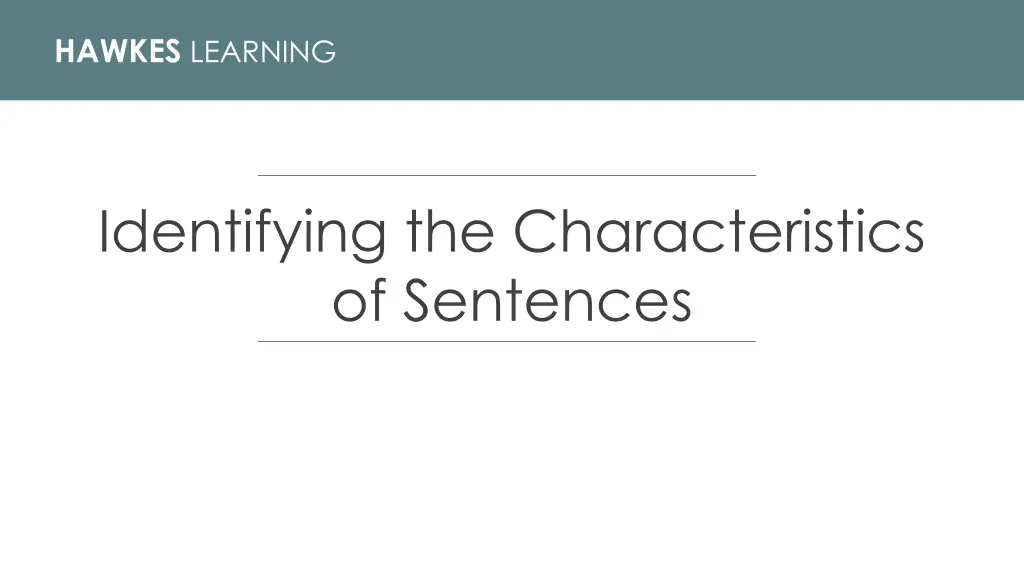
Understanding Characteristics of Sentences for Effective Communication
Learn about the importance of capitalization, punctuation, and parts of speech in crafting complete and correct sentences. Explore the different types of statements and diverse roles of nouns, pronouns, and verbs in language usage. Enhance your writing skills with insights from Hawkes Learning.
Download Presentation

Please find below an Image/Link to download the presentation.
The content on the website is provided AS IS for your information and personal use only. It may not be sold, licensed, or shared on other websites without obtaining consent from the author. If you encounter any issues during the download, it is possible that the publisher has removed the file from their server.
You are allowed to download the files provided on this website for personal or commercial use, subject to the condition that they are used lawfully. All files are the property of their respective owners.
The content on the website is provided AS IS for your information and personal use only. It may not be sold, licensed, or shared on other websites without obtaining consent from the author.
E N D
Presentation Transcript
HAWKES LEARNING Identifying the Characteristics of Sentences
Identifying the Characteristics of Sentences Capitalization and Punctuation Parts of Speech Complete Thought Subject and Predicate HAWKES LEARNING
Capitalization and Punctuation Complete sentences: End with a period, question mark, or exclamation point Begin with a capital letter & HAWKES LEARNING
Capitalization and Punctuation Periods: Make a statement or relay information Florida borders the Gulf of Mexico. Question marks: ask a direct question or request information Have you ever been to Florida? Exclamation points: convey emphasis or strong feeling We are so excited to visit Disney World! HAWKES LEARNING
Capitalization and Punctuation Four types of statements: Declarative: Make general statements; end with period Interrogative: Ask questions; end with question mark Imperative: Make commands; end with period or exclamation point Exclamatory: Communicate emotion; end with exclamation point HAWKES LEARNING
Parts of Speech HAWKES LEARNING
Parts of Speech Noun: Represents person, place, thing, event, or idea Common Proper city Baltimore Count Non-count flower weather HAWKES LEARNING
Parts of Speech Relative Pronouns Personal Pronouns Indefinite Pronouns Introduce relative clauses Refer to nouns in a general way Rename a specific noun Examples: that, which, who Examples: all, many, something Examples: I, my, they HAWKES LEARNING
Parts of Speech Verb Types: Manny opened the jar of peanut butter. Action Verbs: Show mental or physical action Linking Verbs: Link subject to a description The cookies smelled heavenly. Helping Verbs: Change the form of a verb We will try to win a prize. HAWKES LEARNING
Parts of Speech Basic Verb Tenses: Past Tense Linda ate chocolate for breakfast. Present Tense I sing in the shower. Future Tense The class will end in five minutes. HAWKES LEARNING
Parts of Speech Adjectives: Used to describe nouns or pronouns Example: The orange bandana covered his eyes. Adverbs: Used to describe verbs, adjectives, or other adverbs Example: The dancer twirled gracefully. HAWKES LEARNING
Parts of Speech Prepositions: Show relationships among people, places, things, events, and ideas My favorite actor is in the movie. Prepositional Phrase HAWKES LEARNING
Parts of Speech Coordinating Conjunctions Correlative Conjunctions Subordinating Conjunctions Work in pairs to specify relationships Connect similar words, phrases, and clauses Introduce dependent clauses I held the door, and you carried the box to my room. Neither the owl nor the sloth was awake during my zoo visit. I cannot go on the trip unless I get a ride. HAWKES LEARNING
Parts of Speech Interjections: Show emphasis or emotion Example: Hi, Mom. Example: Aha! I solved the puzzle! HAWKES LEARNING
Subject and Predicate HAWKES LEARNING
Subject and Predicate Subject: Noun or pronoun that indicates what the sentence is about Predicate: Indicates what the subject is or does + Example: You scored the most points. HAWKES LEARNING
Subject and Predicate Examples of Subjects: Pierre chased his cat toy. Before the movie started, I finished my popcorn. (You) Come home immediately! Mary and I hiked to the waterfall. HAWKES LEARNING
Subject and Predicate Types of Objects: Direct Object Teddy drank milk. Indirect Object Please show Alice the piano. Object of a Preposition The car parked at the house. HAWKES LEARNING
Subject and Predicate Pronoun Cases: Subjective Case (Examples: I, he, they) He arrived this morning. Objective Case (Examples: me, her, them) Ellen gave the card to her. Possessive Case (Examples: my, your, their) Your smoothie cup needs its lid. HAWKES LEARNING
Subject and Predicate Predicates can take on various forms: Helping Verb + Main Verb The artist will create a custom mural. Compound Verbs Sasha ran and hid behind the tree when she saw Alex. HAWKES LEARNING
Subject and Predicate Verbs can be used as adjectives or nouns: Adjective I passed my driving test. Noun Skiing is my favorite hobby. HAWKES LEARNING
Subject and Predicate Step 1: Put parentheses or brackets around any prepositional phrases. The children smiled eagerly [at the assortment] [of candies]. Step 2: Find the predicate. The children smiled eagerly [at the assortment] [of candies]. Step 3: Ask yourself who or what is doing the action or being described. The children smiled eagerly [at the assortment] [of candies]. HAWKES LEARNING
Complete Thought HAWKES LEARNING
Complete Thought Dependent Clause Since I arrived at the train station early. Independent Clause Since I arrived at the train station early. HAWKES LEARNING


